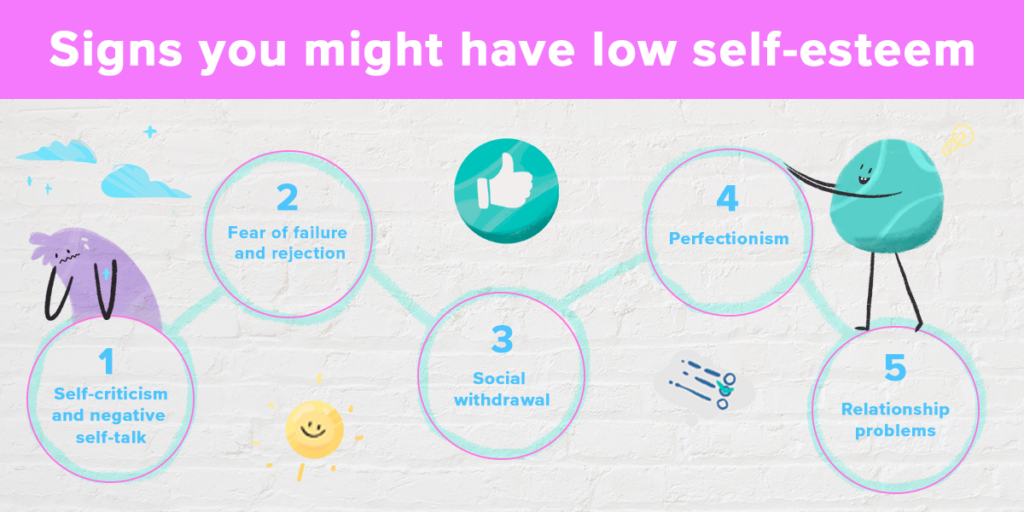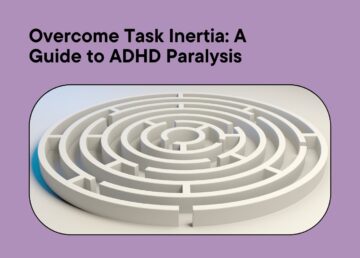Comprehensive Guide to Self-Esteem: What it is, Importance, and Strategies to Build it

In today’s demanding and competitive world, where everyone tries to be the best at something, self-esteem issues have been on the rise – it is estimated that around 85% of the population has been struggling with healthy self-esteem.
Understanding the concept of self-esteem and its impact on our lives is crucial for personal growth, happiness, and success. However, to start nurturing yourself, it’s vital to explore self-esteem’s meaning, delve into its various influencing factors, examine the signs of low self-esteem, and discuss its profound effects on our mental and physical health.
Furthermore, this article will provide several strategies to improve self-esteem and highlight the long-term journey toward building a healthier self-image.
In this article
What is Self-Esteem?
Self-esteem meaning can be described as the overall perception we hold about ourselves. It encompasses our beliefs, thoughts, and feelings regarding our worthiness, competence, and value as individuals.
Research suggests that self-esteem is closely linked to our mental and emotional well-being, influencing our confidence, resilience to stressors, and overall quality of life.
Healthy self-esteem fosters a positive self-image, self-acceptance, and a sense of self-worth. It encourages us to approach challenges confidently and maintain a positive outlook on life. Low self-esteem, on the other hand, includes negative self-talk, poor self-perception and cultivates fear and anxiety.
Distinguishing Self-Esteem from Self-Confidence
While self-esteem and self-confidence are related concepts, they are not interchangeable. Self-esteem reflects our overall perception and evaluation of ourselves, enclosing our feelings of self-worth.
In contrast, self-confidence is the belief in our abilities to perform specific tasks or achieve certain goals. While external factors influence self-confidence, self-esteem is deeply rooted in our core beliefs and self-perception.
Factors Influencing Self-Esteem
Self-esteem is not something we are born with. Instead, it is shaped and influenced by various factors and can fluctuate throughout our lives. Understanding these factors can provide insights into the development and fluctuation of self-esteem and provide a solid ground for nurturing healthy self-esteem.
Genetics and temperament
Some research suggests that genetics can contribute to our predisposition toward self-esteem. Certain genetic factors can influence personality traits, including traits associated with self-esteem, such as resilience and emotional stability.
However, it is essential to understand that genetics only provide a predisposition, and environmental factors still play a significant role in shaping one’s self-esteem.
Childhood experiences
The formative years of childhood significantly impact the development of self-esteem. Positive experiences such as receiving love, support, and encouragement from caregivers foster a sense of security and self-worth.
Conversely, negative experiences, such as neglect, abuse, or constant criticism, can erode self-esteem and overall mental health, leading to feelings of inadequacy and self-doubt.
Relationships and social environment
The quality of our relationships and environment also play a crucial role in shaping our self-esteem. Positive, nurturing relationships with family, friends, and peers can provide validation, support, and a sense of belonging, thus boosting self-esteem.
On the other hand, toxic or abusive relationships – whether during childhood or adulthood – can significantly contribute to feelings of unworthiness and low self-esteem.
Media and societal influences
Media and societal influences play a significant role in shaping self-esteem. The portrayal of idealized beauty standards, lifestyles, and achievements in media and society can create unrealistic expectations and comparisons that can negatively impact individuals’ self-perception and self-worth.
Unrealistic beauty standards and body image dissatisfaction, social comparison, objectification, and stereotypes can foster low self-esteem in individuals who don’t fit into societal norms.
On the flip side, the number of positive role models, empowerment, and inclusivity has been rising. Hence, a more varied presentation in media can help build self-esteem for people who feel left out of traditional standards.
Signs of Low Self-Esteem
Recognizing the signs of low self-esteem is essential for self-awareness and initiating positive change. If you notice any of the following signs in yourself or others, they may indicate underlying issues with self-esteem.
Negative self-talk
Negative self-talk involves critical and self-deprecating thoughts and beliefs about oneself, often shared with others. Examples include:
- Constant self-criticism.
- Labeling oneself as unworthy or inadequate.
- Focusing on perceived flaws or shortcomings.
Fear of failure or rejection
People with low self-esteem often fear failure or rejection since they were led to believe their capabilities are below expectations. Hence, they may refrain from taking risks or pursuing their goals due to a lack of confidence in their abilities.
Social withdrawal
Low self-esteem can lead to social withdrawal and isolation, as you might feel unworthy of social interaction. Also, fear of judgment and criticism from others can be a sign of low self-esteem.
Perfectionism and procrastination
Aiming for perfection and, thus, procrastinating on tasks can be indicators of low self-esteem.
The fear of making mistakes or being perceived as flawed can hinder productivity and personal growth, as well as have a negative impact on mental health.
Media and societal expectations
Media and societal standards can significantly impact self-esteem – usually not in a good way.
Unrealistic beauty standards, constant comparison with others, and continuous exposure to perfect, curated lives on social media can contribute to negative feelings, low self-esteem, and lesser life satisfaction.

The Impact of Low Self-Esteem on Mental and Physical Health
Low self-esteem can profoundly affect mental and physical health, further emphasizing the importance of practicing self-love and building healthy self-esteem.
While it’s undeniable that low self-esteem affects one’s mental health, more areas of life can be affected.
Mental health: depression and anxiety
People with low self-esteem are more susceptible to depression and anxiety disorders – a study conducted in 2017 found a link between low self-esteem and depression, especially among adolescents and young adults.
Negative self-perception, constant self-criticism, and a lack of belief in one’s abilities can contribute to persistent sadness, hopelessness, and anxiety.
Relationship problems
Low self-esteem can strain interpersonal relationships – struggle with trust, assertiveness, and vulnerability can affect communication.
It can lead to difficulties in establishing and maintaining healthy personal connections, often resulting in conflicts and isolation.
Poor decision-making and coping skills
Individuals with low self-esteem may lack confidence in their decision-making abilities and struggle with assertiveness, as they might feel their decisions are wrong or unwanted.
They may also exhibit maladaptive coping mechanisms, such as avoidance or self-destructive behaviors (alcohol or drug abuse, addictions, self-sabotage, etc.), to cope with negative emotions.
Physical health issues
Oftentimes, self-esteem causes loads of unnecessary stress leading to health issues. Hence, the impact of low self-esteem can extend to physical health.
Studies have shown a correlation between low self-esteem and a higher risk of developing chronic health conditions, such as cardiovascular diseases, immune system dysfunction, and impaired overall well-being.
Strategies to Improve Self-Esteem
Fortunately, self-esteem is not fixed and can be improved. There are several effective strategies to nurture and boost it, but it requires getting in touch with your emotions and actively trying to challenge negative beliefs about oneself.
Cultivate self-awareness
Developing self-awareness involves recognizing and challenging negative self-perceptions and beliefs. For example, people with low self-esteem might believe they are bad friends or employees.
Engaging in introspection, acknowledging positive qualities, strengths, and weaknesses, and embracing self-acceptance can bring the reason for these beliefs to the surface. In some cases, these assumptions might not have any evidence, and sometimes they might. However, accepting yourself as you are and aiming for improvement is the first step.
Challenging negative thoughts and beliefs
Negative thinking patterns prevent people from building self-esteem and noticing their self-worth.
Actively challenging negative thoughts and replacing them with positive and realistic affirmations can help reframe self-perception. This process involves questioning negative beliefs’ validity and consciously adopting more supportive and empowering thoughts.
If you believe you are a lousy friend, try looking for evidence why this assumption is incorrect. For example, maybe you’re always there to listen to your friends vent, help them move, or babysit their children or pets when asked.
Set realistic goals and celebrate achievements
Setting realistic expectations and goals that align with personal values and strengths fosters a sense of accomplishment and can boost self-esteem.
Celebrating achievements, no matter how small, reinforces a positive self-image and builds confidence.
Receiving a “good job” from your boss, a “thank you” from a family member, or simply completing your chores can be significant for the time being.
Develop strong social connections
People are social animals, and we crave social contact with others. Hence, developing supportive and healthy relationships with peers and family members is crucial to developing healthy self-esteem.
Surround oneself with positive and uplifting people that you trust and care about – it will provide validation, encouragement, and a sense of belonging.
Practice self-compassion and self-care
People with low self-esteem tend to forget or ignore their needs – often because they think they are unworthy of the good things in life. However, self-compassion, self-respect, and self-care are vital elements in developing positive self-esteem – we all deserve happiness.
Treat yourself with kindness despite past mistakes, engage in self-care activities that promote physical, mental, and emotional well-being, and practice positive self-talk and affirmations. It might feel silly at first, but over time it can cultivate higher self-esteem and a more positive outlook overall.
How to Work on Your Self-Esteem
Building and maintaining healthy self-esteem is a lifelong journey – it can fluctuate, and some days might be better than others.
While self-help strategies can be beneficial and bring more self-respect and nurture self-compassion, there may be instances when professional help is needed. If you feel like you cannot achieve healthy self-esteem on your own, try looking into available aids.
When to seek professional help
If low self-esteem significantly impacts your daily life, relationships, or overall well-being (e.g., low self-esteem causes self-sabotage, eating disorders, or causes significant physical and mental health issues), it may be beneficial to seek the guidance of a professional.
They can provide specialized support and therapeutic interventions tailored to your specific needs.
Types of therapy for self-esteem issues
Various therapeutic approaches can address self-esteem issues effectively. Cognitive Behavioral Therapy (CBT) is particularly effective in challenging negative beliefs, developing coping strategies, and fostering self-empowerment and self-respect.
CBT focuses on rewiring your thinking and building strong self-esteem through self-exploration and behavioral experiments.
There are psychotherapists who specialize in cognitive behavioral therapy and can help you work through self-esteem issues during therapy sessions.
Sensa for self-esteem
However, if face-to-face therapy is not available to you, you can try improving your self-esteem in the comfort of your home.
Sensa is a CBT-based app developed with mental health specialists. It addresses low self-esteem through daily tasks and experiments. You can measure self-esteem in the app and focus on the areas that need improvement the most.
Sensa provides the necessary tools and resources to challenge negative thinking patterns and the inner critic, set realistic goals, cultivate self-awareness, improve self-worth, and develop coping skills.
Through its user-friendly interface and guidance, Sensa aims to empower individuals on their journey toward building and maintaining healthy self-esteem, fostering positive relationships, providing space for self-actualization, and building emotional intelligence.
Embracing a Journey to Healthy Self-Esteem
Self-esteem is a fundamental aspect of our overall well-being and success. It encompasses our perception of self-worth, competence, and self-worth. Understanding the factors that influence self-esteem, recognizing the signs of low self-esteem, and comprehending its impact on our mental and physical health is essential for personal growth and happiness.
As you navigate your path toward higher self-esteem, don’t hesitate to try tools and approaches to help you reach your goals. Sensa can assist you in developing a positive self-perception, enhancing your mental and emotional well-being, and experiencing the lifelong benefits of strong and healthy self-esteem.
Discover what self-esteem is, signs of low self-esteem, and effective strategies to improve your self-worth and overall well-being.
Frequently Asked Questions
What is meant by self-esteem?
Self-esteem is how much you value and respect yourself. It is a complex feeling that is influenced by many factors, including your thoughts, feelings, and experiences. When you have high self-esteem, you feel good about yourself and believe that you are capable and worthy of love and respect. When you have low self-esteem, you feel bad about yourself and doubt your abilities and worth.
How do you fix bad self-esteem?
It can be difficult to fix bad self-esteem on your own, but there are a number of things you can do to improve your self-worth. Here are a few tips:
- Challenge your negative thoughts: When you have negative thoughts about yourself, try to challenge them with more realistic and positive ones. For example, if you think “I’m not good enough,” try to think “I’m capable and I’m doing the best I can.”
- Set realistic goals and celebrate your accomplishments: When you achieve your goals, no matter how small, take the time to celebrate your accomplishments. This will help you to build confidence and reinforce positive beliefs about yourself.
- Practice self-compassion: Be kind to yourself and forgive yourself for your mistakes. Everyone makes mistakes, and you don’t need to be perfect to be worthy of love and respect.
- Surround yourself with positive people: Spend time with people who make you feel good about yourself and who support your goals. Avoid people who are negative or who put you down.
- Get professional help if needed: If you’re struggling to improve your self-esteem on your own, talk to a therapist or counselor. They can help you to identify the root of your low self-esteem and develop strategies for overcoming it.
Why is self-esteem important?
Self-esteem is important for many reasons. It can affect your relationships, your career, and your overall happiness. Here are a few of the benefits of having high self-esteem:
- Improved relationships: People with high self-esteem are more likely to have healthy and fulfilling relationships. They are also more likely to be assertive and stand up for themselves in their relationships.
- Greater success in your career: People with high self-esteem are more likely to be successful in their careers. They are more likely to take risks, be confident in their abilities, and persist in the face of challenges.
- Increased happiness: People with high self-esteem are generally happier and more satisfied with their lives. They are more likely to experience positive emotions and less likely to experience negative emotions such as sadness, anxiety, and depression.
How do you build self-esteem?
There are a number of things you can do to build your self-esteem. Here are a few tips:
- Focus on your strengths: Take some time to think about your strengths and accomplishments. Make a list of your positive qualities and remind yourself of them often.
- Practice gratitude: Take some time each day to reflect on the things you are grateful for. This can help you to focus on the positive aspects of your life and appreciate your own worth.
- Learn to say no: Don’t be afraid to say no to things you don’t want to do. This will help you to protect your time and energy and focus on the things that are important to you.
- Take care of yourself: Make sure you are taking care of your physical and mental health. Eat healthy foods, get enough sleep, and exercise regularly. This will help you to feel your best and have more energy to pursue your goals.
- Help others: Helping others can make you feel good about yourself and boost your self-esteem. Volunteer your time, donate to charity, or simply do something nice for someone else.
Building self-esteem takes time and effort, but it is possible. By following these tips, you can begin to improve your self-worth and live a happier and more fulfilling life.
References:
- Pyszczynski, T., Greenberg, J., Solomon, S., Arndt, J. and Schimel, J., 2004. Why do people need self-esteem? A theoretical and empirical review. Psychological bulletin, 130(3), p.435.
- Zeigler-Hill, V. ed., 2013. Self-esteem (Vol. 1). Psychology Press.
- Blascovich, J., Tomaka, J., Robinson, J.P., Shaver, P.R. and Wrightsman, L.S., 1991. Measures of self-esteem. Measures of personality and social psychological attitudes, 1, pp.115-160.
- Cast, A.D. and Burke, P.J., 2002. A theory of self-esteem. Social forces, 80(3), pp.1041-1068.
- Orth, U. and Robins, R.W., 2014. The development of self-esteem. Current directions in psychological science, 23(5), pp.381-387.
- Harter, S., 2006. The development of self-esteem. Self-esteem issues and answers: A sourcebook of current perspectives, pp.144-150.





